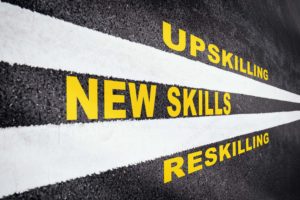The Outlook and Inlook
of a Citizen-Activist
The Outlook of a Citizen-Activist: Binocular Vision
 To accomplish our mission as citizen-activists, we will first have to change our perspective. Unlike our current focus which ignores everything but the issues of the moment, we will have to condition ourselves to address the challenges of two time periods at once: those in the present and those in the future. To be sure, we must not shirk from tackling today’s problems – the Covid-19 pandemic and other virulent diseases, social justice, income inequality, and foreign aggressors, to name just a few – but simultaneously, we must also devote ourselves to confronting the Titanicity. In effect, we must acquire the binocular vision to accept two #1 priorities and act on both of them concurrently.
To accomplish our mission as citizen-activists, we will first have to change our perspective. Unlike our current focus which ignores everything but the issues of the moment, we will have to condition ourselves to address the challenges of two time periods at once: those in the present and those in the future. To be sure, we must not shirk from tackling today’s problems – the Covid-19 pandemic and other virulent diseases, social justice, income inequality, and foreign aggressors, to name just a few – but simultaneously, we must also devote ourselves to confronting the Titanicity. In effect, we must acquire the binocular vision to accept two #1 priorities and act on both of them concurrently.
This perspective is necessary because time is not on our side. Today’s problems eat away at our national strength and degrade our sense of a common destiny. If we don’t get bigotry and oligarchism and every other contemporary issue resolved, we will lose our vitality as a people and our strength as a nation. On the other hand, the Technological and Climatic Singularities cannot be effectively resolved if we don’t begin to work on them at this moment, right now. They are too large and destructive for last minute fixes, and those fixes are essential to ensuring a healthy and fulfilling life in America now and in the future. We can’t resort to longstanding practices, therefore; we don’t have the luxury of dealing with one challenge after another. We do, however, have a precedent that should give us confidence we can tackle both near- and long-term challenges at the same time.
Focusing on the Present & the Future
 Americans are present-day problem-solvers. We focus on the here and now and take on the future’s problems as soon as they get here and now. The only modern exception to that familiar mode of operation occurred in the 1960s. At that time, America was embroiled in a civil rights struggle, a cold war with Russia, an unpopular war in Vietnam and a counterculture movement. Those issues of the day were more than enough to grab and hold the attention of the American people and keep their government busy. President John F. Kennedy, however, inspired them to look to the future, at the same time. In his 1961 “Moon Shot” speech, he called us to a mission that would take almost ten years to complete – to put an American on the moon and return him safely to Earth. America’s success in making progress, however imperfect, on the challenges it faced in the near-term – the Civil Rights Act of 1964, for example – and at the same time in taking one small step for man, one giant leap for mankind are proof positive its citizens can deal with two challenges at once and make progress on both.
Americans are present-day problem-solvers. We focus on the here and now and take on the future’s problems as soon as they get here and now. The only modern exception to that familiar mode of operation occurred in the 1960s. At that time, America was embroiled in a civil rights struggle, a cold war with Russia, an unpopular war in Vietnam and a counterculture movement. Those issues of the day were more than enough to grab and hold the attention of the American people and keep their government busy. President John F. Kennedy, however, inspired them to look to the future, at the same time. In his 1961 “Moon Shot” speech, he called us to a mission that would take almost ten years to complete – to put an American on the moon and return him safely to Earth. America’s success in making progress, however imperfect, on the challenges it faced in the near-term – the Civil Rights Act of 1964, for example – and at the same time in taking one small step for man, one giant leap for mankind are proof positive its citizens can deal with two challenges at once and make progress on both.
To overcome the Titanicity, we will have to do so again and do even more. We will have to contend with the momentous issues of our time, and we will have to accept a challenge that won’t peak for years to come. We will have to find the courage and compassion to address both historical injustices and contemporary inequities and, at the very same time, confront the human behaviors that, if left uncorrected, will savage American life for our kids and grandkids and their kids and grandkids as well. Unlike any other group of citizens in American history – today’s American generations – must do their duty in the present – for both the present and for the future.
How can they accomplish such a feat? By discovering, developing and applying their talent – their inherent capacity for excellence.
The Inlook of a Citizen-Activist: Talent
 The common understanding of talent limits it to exceptional people who engage in exceptional activities. According to this view, only a very few individuals have talent, and their talent is expressed in only the most rarefied of fields and feats. People of talent are professional athletes, entertainers and artists. An opera singer at the Metropolitan Opera in New York City has talent while the best a bank teller or a plumber, a salesperson or a teacher can be is good at their job. Talent, Americans are taught and told, isn’t something the masses have, nor is it really talented to be an exceptional performer in unexceptional occupations.
The common understanding of talent limits it to exceptional people who engage in exceptional activities. According to this view, only a very few individuals have talent, and their talent is expressed in only the most rarefied of fields and feats. People of talent are professional athletes, entertainers and artists. An opera singer at the Metropolitan Opera in New York City has talent while the best a bank teller or a plumber, a salesperson or a teacher can be is good at their job. Talent, Americans are taught and told, isn’t something the masses have, nor is it really talented to be an exceptional performer in unexceptional occupations.
This habit of ascribing talent to only a select few is a pretension that strikes at the very heart of human equality and American democracy. It is an elitist view of human capabilities that has its roots in the industrial era. In the early decades of the 20th Century, mass manufacturers—most notably those that produced cars and steel—needed workers who would labor as machines and perform the same tasks over and over again. To legitimize this drone-like existence, the social arbiters of the time created the concept of America’s “unwashed masses” to set common people—the working class—apart from their more educated and cultured betters. It was a derogatory description of people with synonyms like “boorish,” “simple-minded” and “vulgars.”
Not to be outdone, the country’s academic establishment reinforced the talent divide by introducing a developmental structure and programmatic format designed to relegate all but an exceptional few to mediocrity. Called “gifted and talented” programs in elementary school and “advanced placement” in high school, these initiatives didn’t just serve the needs of smart kids—an admirable goal. They also communicated a sense of inferiority to all those who were not selected. In effect, the “normal” kids were told they didn’t have talent or advanced capabilities and thus were second class citizens in the nation’s educational system.
A More Pluralistic Perspective
 The dictionary, thankfully, takes a more pluralistic view of talent. It defines the word as “the natural endowments of a person” and then defines an endowment as “a natural gift, ability or quality.” There is no qualifier limiting talent to extraordinary people or to extraordinary endeavors. The term is not reserved for the infallible and famous or even for the in-your-face and infamous. Quite the contrary, talent is a natural characteristic of the human species – as much a part of who we all are as our opposable thumb – and is expressed in the full range of our idiosyncratic interests and occupations.
The dictionary, thankfully, takes a more pluralistic view of talent. It defines the word as “the natural endowments of a person” and then defines an endowment as “a natural gift, ability or quality.” There is no qualifier limiting talent to extraordinary people or to extraordinary endeavors. The term is not reserved for the infallible and famous or even for the in-your-face and infamous. Quite the contrary, talent is a natural characteristic of the human species – as much a part of who we all are as our opposable thumb – and is expressed in the full range of our idiosyncratic interests and occupations.
There is talent in being an exceptional civil engineer and extraordinary truck driver. Talent can be expressed by an especially good customer service representative and software developer, and by a truly outstanding electrician, mechanic, carpenter and computer programmer. The talent is not in what a person does, but in how they do it. They might be particularly good are communicating complex ideas verbally or in writing. Or remarkably effective in organizing diverse groups into effective work teams. Or very adept at relating to others and understanding their concerns. Talent, in effect, is each person’s capacity for excellence, and that excellence can be attained in any and every profession, craft and trade.
Applying Talent to a Binocular Vision
 Some people are lucky. They recognize their capacity for excellence and devote themselves to experiencing it in their work. Most of us, however, aren’t so fortunate. Our culture and educational system work against the discovery of our talent. Whether it’s in elementary school, high school or college, kids and young adults are neither encouraged nor taught how to:
Some people are lucky. They recognize their capacity for excellence and devote themselves to experiencing it in their work. Most of us, however, aren’t so fortunate. Our culture and educational system work against the discovery of our talent. Whether it’s in elementary school, high school or college, kids and young adults are neither encouraged nor taught how to:
- search for and identify their talent,
- develop the fullest capability of their talent, or
- apply their talent to work that fulfills them.
As a consequence, they spend their entire careers working at a job they hate or underperforming in a job that doesn’t suit them or just putting in the time until they can retire (and do something else, something they really love to do).
Citizen-activists refuse to accept this abusive system. They are determined to become their own person of talent. They make it their job to identify their unique capacity for excellence – the intersection of what they love to do and do best. Each search for answers is different, of course, but all are in some way informed by the multitude of resources that that are available to them. They can talk with a trusted counselor or mentor, they might spend some time reviewing and learning from their own work and life experiences or they can embark on an educational journey by tapping into online articles, assessments and studies.
Whatever path they take, however, citizen-activists share three core beliefs:
- First, they believe that finding and experiencing their talent is their right as an American citizen. Working at one’s talent is the only way to achieve fulfillment, and fulfillment is the fuel that powers the pursuit of Happiness.
- Second, they believe that the only way they can overcome the human behaviors that are creating the perfect catastrophe of simultaneous Technological and Climatic Singularities is with the sustained application of their talent.
- And third, they believe that the appreciation of talent as a democratic attribute is the foundation of the Neonaissance – America’s transformation into the world’s first noble democracy.
Citizen-activists are “ordinary” Americans committed to using their talent to achieve extraordinary ends. They are the next generations in the long line of America’s greatest citizens. They are We the People at our finest.
ICAN, The Intrepid Citizen-Activist Newsletter
A publication with the latest news about what citizen-activists are doing to overcome the Titanicity and establish the Neonaissance.
